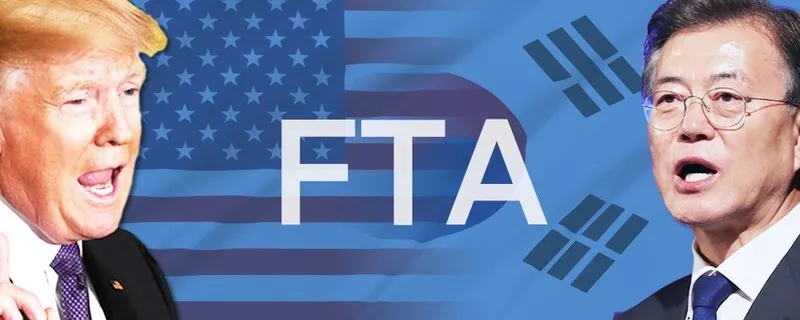hankyoreh
Links to other country sites 다른 나라 사이트 링크
[Editorial] South Korea must prepare to mitigate US pressure on trade

During the South Korea-US summit that was held at the White House last week, Moon Jae-in and Donald Trump agreed to set up a high-level economic consultation body to discuss the issue of the trade imbalance. According to the South Korean government, the two sides made no agreement to revise the South Korea-US Free Trade Agreement (KORUS FTA). But the Americans have made various remarks suggesting that negotiations to revise the KORUS FTA are about to begin, leaving a bad aftertaste.
“We are renegotiating a trade deal right now with South Korea,” Trump said in the opening remarks to the summit. During his joint press conference with Moon, Trump stressed that the KORUS FTA was “not exactly a great deal” for the US and that the US would not allow the trade deficit to continue.
During an event held at the White House after the summit, Trump made some puzzling remarks that contradicted the facts, claiming that the KORUS FTA had already expired two weeks ago. While this kind of one-sided expression that risks being a diplomatic gaffe is largely motivated by domestic political considerations, what‘s clear is that the issue of the trade imbalance that the US has been raising was not neatly resolved during the summit.
Trump has cited steel and automobiles as prime examples of unfair trade between the two countries. Though these are indeed areas in which South Korea has a large trade surplus, they are also major industries in the so-called “rust belt,” where Trump gathered support with his policy of protectionism and his opposition to immigration. In light of that, Trump is likely to use pressure of one sort or another to engineer a change in the situation that is advantageous to the US. He could also conceivably use his request to revise the KORUS FTA as leverage in the negotiations.
Since Trump’s inauguration as president, the South Korean government has taken steps such as actively buying American products to lessen pressure from the US, including possible designation as an exchange rate manipulator. South Korean imports from the US in the first half of the year were up 22%, which has caused the scale of the trade surplus to decrease 37.9% from US$13.15 billion in the first half of 2016 to US$8.16 billion in the first half of 2017. The business leaders who joined Moon on his visit to the US announced 14.6 trillion won (US$12.76 billion) worth of planned facility investment in the US. We need to determine the US‘s exact motivations as we accurately assess whether such measures constitute a plan that can mitigate American displeasure without having a major negative impact on our economy.
Because negotiations involve so many variables, we will have to prepare carefully to ensure that we can respond flexibly within the circumstances. We should waste no time in setting up an office to effectively coordinate commerce and trade. The Moon administration is planning to reorganize the Ministry of Trade, Industry and Energy to create a new head of the office of trade negotiations (a vice minister in rank), but the revision to the Government Organization Act is being held up in the National Assembly.
Please direct questions or comments to [english@hani.co.kr]

Editorial・opinion
![[Column] Chaebol can’t take credit for KOSPI’s record rally [Column] Chaebol can’t take credit for KOSPI’s record rally](https://flexible.img.hani.co.kr/flexible/normal/500/300/imgdb/original/2025/1009/7717599742966572.jpg) [Column] Chaebol can’t take credit for KOSPI’s record rally
[Column] Chaebol can’t take credit for KOSPI’s record rally![[Column] Solving the dilemma of OPCON transfer and inter-Korean relations [Column] Solving the dilemma of OPCON transfer and inter-Korean relations](https://flexible.img.hani.co.kr/flexible/normal/500/300/imgdb/original/2025/1008/7017598865521297.jpg) [Column] Solving the dilemma of OPCON transfer and inter-Korean relations
[Column] Solving the dilemma of OPCON transfer and inter-Korean relations- [Column] Korea, don’t trust and don’t be fooled
- [Column] Understanding what the US means by ‘modernizing’ its alliance with Korea
- [Editorial] Judge’s conduct undermines confidence in Yoon’s insurrection trial
- [Editorial] Government negligence comes under scrutiny after Korean data center fire
- [Column] Trump at the UN: The braggadocio of evil
- [Editorial] Disruptions to government systems raises questions about Korea’s status as IT powerhouse
- [Column] There’s no compromising on ending the insurrection
- [Column] America is marching toward fascism
Most viewed articles
- 1What parallel visits to both Koreas by leaders of China, Russia may mean for NE Asia
- 2Will upcoming Korea summit allow Lee to get through to Trump on tariffs?
- 3From ‘kimbap’ to ‘maknae,’ Oxford English Dictionary sees explosion of Korean loanwords
- 4Takaichi’s rise raises concerns about stability of Seoul-Tokyo relations
- 5Special counsel seeks arrest of former justice minister on suspicion of aiding insurrection
- 6[Column] Hemedti, a true ‘hero’ of our time
- 7Women gather to protest biased investigations into hidden-camera incidents
- 8In a divided America, civic assemblies prove respectful debate is still possible
- 9[Column] Facing our fear of the “welfie” in “All of Us Are Dead”
- 10[Interview] Ensuring governments listen to proposals from the public a key piece of deliberative dem